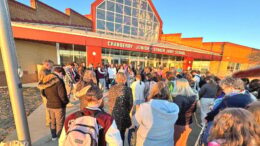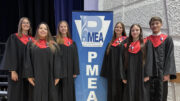SACRAMENTO, Calif. (AP) — After years of prep work, Gov. Jerry Brown’s finance department decided Friday that California’s $64 billion high-speed rail project is ready to lay some track.
The administration approved the rail authority’s request to spend $2.6 billion on work in the Central Valley. The decision lets the authority ask the state treasurer’s office to sell a portion of the nearly $10 billion in bonds voters approved in 2008 for a bullet train.
However, the first 29-mile segment of track isn’t expected to be completed until at least August 2019.
The bullet train’s long-term prospects remain clouded because of uncertainty over funding and several pending lawsuits. Significant federal help is required, and the Republican-controlled Congress does not support the project. Private money also is needed but none has been secured yet.
The treasurer previously issued $1.15 billion of the bonds that went for administration and on work to connect the new system to existing tracks, leaving the bulk of the money unspent.
Finance Director Michael Cohen approved the Central Valley plan while downplaying a Federal Railroad Administration risk analysis that included a worst-case scenario for the costs of the project. He instead cited the authority’s more optimistic analysis and an independent consultant’s review that he said found that “the cost estimates and contingencies in this plan are reasonable.”
Brown is a vocal advocate of the rail project, and his administration includes the finance department, so Friday’s decision is not surprising.
The authority will ask the state treasurer to sell a portion of the bonds this spring to help pay for construction of 119 miles of rail in the Central Valley from Madera to Shafter, authority spokeswoman Lisa Marie Alley said.
Cohen delayed a decision on the authority’s related request for $600 million for Caltrain in the San Francisco Bay Area. Bullet trains travel on electrified rails, and the California authority’s business plan calls for the two systems to share lines along the Peninsula Corridor in the Bay Area.
Cohen said in a separate letter that he is waiting because the Federal Transit Administration last month delayed a decision on whether to approve a $650 million federal grant for electrification.
“The state’s substantial investment in this critical infrastructure improvement project is ready to move forward, the only remaining piece is action by the federal government on their contribution,” Alley said in a statement referring to the Federal Transit Administration’s delay.
Congressional Republicans have urged the administration to reject the application, and the agency said last month that it is deferring a ruling until the project is considered as part of President Donald Trump’s budget.
Although congressional Republicans oppose the plan, Trump has previously spoken positively about high-speed rail.






































